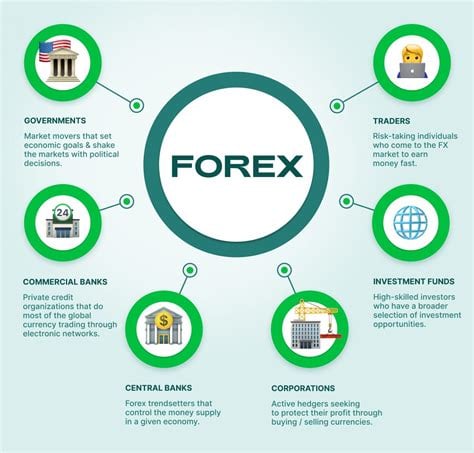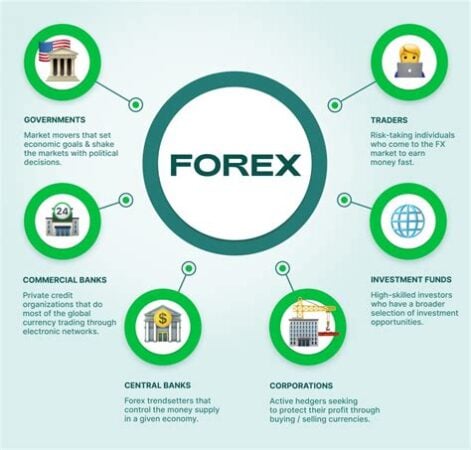
What Is the Forex Exchange? A Comprehensive Guide for Beginners

Introduction
Hey there, readers! Welcome to our in-depth exploration of the forex exchange, the world’s largest and most liquid financial market. If you’ve ever wondered about the enigmatic realm of currency trading, this article has got you covered.
The forex exchange is the decentralized marketplace where currencies from all over the globe are traded. It’s a fascinating and complex landscape that can be simultaneously intimidating and exhilarating for newcomers. But fear not, because we’re here to break down its intricacies and equip you with the knowledge you need to navigate it successfully.
Section 1: Understanding the Basics of Forex Trading
Forex Market Participants
The forex market is a global network of banks, financial institutions, brokers, and retail traders who engage in currency trading. Banks and financial institutions dominate the market, accounting for over half of all transactions. However, retail traders are increasingly playing a significant role, contributing to the market’s liquidity and volatility.
Currency Pairs and Quotes
Currencies are always traded in pairs, with one currency quoted against another. The most commonly traded currency pair is EUR/USD, representing the exchange rate between the euro and the US dollar. Currency quotes indicate the amount of one currency required to buy one unit of another currency.
Section 2: Mechanics of Forex Trading
Spot Transactions
Spot transactions involve the immediate exchange of currencies at the current market rate. They are the most common type of forex transaction, settling within two business days. Spot rates are determined by supply and demand, influenced by economic data releases, political events, and market sentiment.
Forward Contracts
Forward contracts are agreements to exchange currencies at a predetermined rate on a future date. They are used to lock in exchange rates for future transactions, hedging against potential exchange rate fluctuations.
Section 3: Factors Influencing Forex Rates
Economic Data
Economic data, such as GDP growth rates, inflation figures, and interest rate decisions, significantly impact forex rates. Strong economic data tends to strengthen a currency’s value, while weak data can lead to depreciation.
Political Events
Political events, like elections, wars, and trade disputes, can also have a profound impact on forex rates. Uncertainty and instability can cause investors to seek safe-haven currencies, leading to fluctuations in the market.
Psychological Factors
Market sentiment and speculation play a significant role in forex rates. Positive sentiment towards a currency can drive up its value, while negative sentiment can lead to its decline.
Forex Currency Correlation Table
| Currency | Correlation |
|---|---|
| EUR/USD | -0.56 |
| GBP/USD | -0.45 |
| USD/JPY | 0.52 |
| AUD/USD | 0.63 |
| NZD/USD | 0.58 |
Conclusion
So, there you have it, dear readers, a comprehensive overview of the forex exchange. We hope this article has shed light on the intricacies of this vast and dynamic market.
If you’re keen on delving deeper into the world of forex trading, we encourage you to check out our other articles and resources. Remember, knowledge is power, and with proper education and guidance, you can harness the opportunities that the forex market offers.
Go forth, explore, and conquer the currency trading realm!
FAQ about Forex Exchange
What is Forex Exchange?
Forex exchange, also known as FX or foreign exchange, is the conversion of one currency to another. It is the world’s most traded market, with a daily trading volume of trillions of dollars.
Why is Forex Exchange Needed?
Forex exchange is needed for international trade and travel. When goods or services are bought or sold across borders, the currencies involved must be exchanged.
What Currencies are Traded in Forex?
The most commonly traded currencies are the US dollar, Euro, Japanese yen, British pound, and Swiss franc. These currencies are often referred to as "major currencies."
How is Forex Exchange Traded?
Forex exchange is traded over-the-counter (OTC), meaning it is not traded on a centralized exchange. Instead, trades are executed between two parties, typically through a bank or broker.
What is a Forex Broker?
A forex broker is a financial intermediary that connects buyers and sellers of currencies. Brokers provide platforms for trading, as well as services like market analysis and order execution.
What is Forex Leverage?
Forex leverage allows traders to borrow money to increase the size of their trades. While this can increase potential profits, it also increases the risk of losses.
What are Forex Pips?
A pip (point in percentage) is the smallest unit of price movement in forex trading. Pips are used to measure the profit or loss on a trade.
What are Forex Spreads?
A forex spread is the difference between the bid and ask prices of a currency pair. The spread represents the profit margin of the broker.
What Factors Affect Forex Rates?
Forex rates are influenced by a variety of factors, including economic data, geopolitical events, and central bank policies.
Is Forex Exchange Legal?
Forex exchange is legal in most countries. However, there are some countries that restrict or prohibit forex trading for their citizens.


